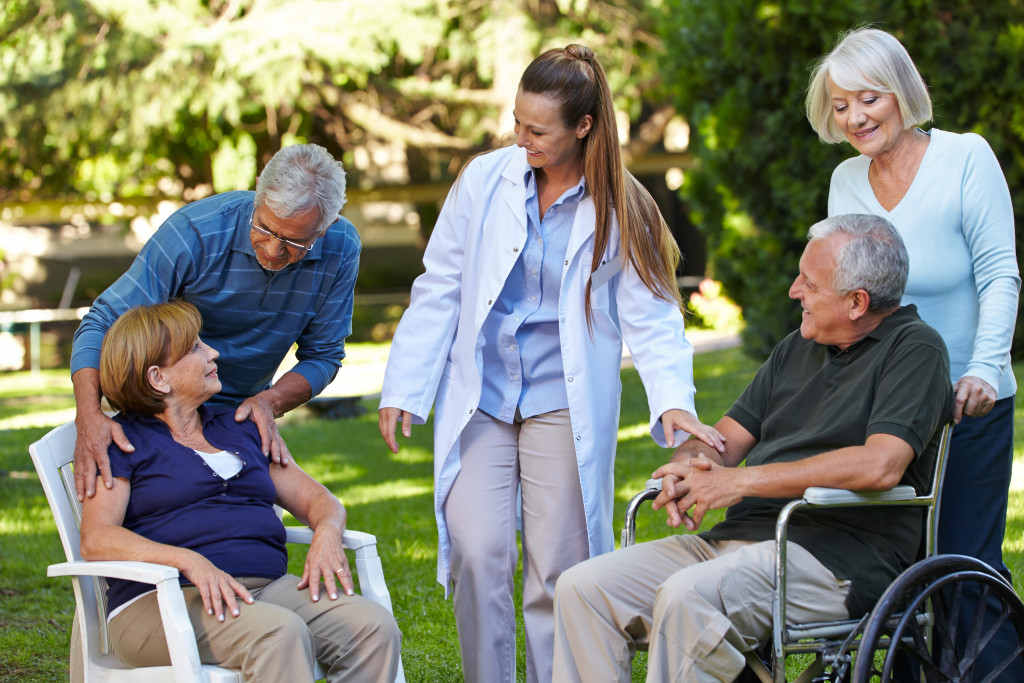Aging can be difficult for many reasons — one of which is that elderly people are at an increased risk of developing specific ailments due to their age. But the good news is, these ailments can often be treated with proper care and attention! Here are some common yet totally treatable disorders among elderlies.
Arthritis
Arthritis is a condition that causes inflammation and pain in the joints. It can be pretty painful and make it hard to move around. Fortunately, there are treatments available to help manage the symptoms.
Arthritis treatments often include lifestyle changes, such as eating healthy and exercising regularly. These include medications, physical therapy, exercises, heat or cold therapy, electrical stimulation, and surgery.
Additionally, many elderly people find relief with alternative treatments such as acupuncture and massage therapy. If possible, it’s always best to consult a doctor before seeking out any alternative therapies.
Dementia
Dementia is a term used to describe a group of symptoms that can cause difficulty in remembering, thinking, or understanding. It’s an umbrella term for many different types of dementia and can affect elderly people differently depending on the kind they have.
The most common form of treatment for dementia is medication. However, there are also a variety of non-medication treatments available to help manage the symptoms, such as cognitive stimulation therapy (CST).
CST involves engaging in activities that stimulate brain function and increase awareness. It can be used to improve memory, problem-solving, orientation, communication, and other daily living skills.
Osteoporosis
Osteoporosis is a condition in which bones become weak and brittle due to a lack of calcium in the diet or bone loss caused by aging. While there is no cure for osteoporosis, treatments are available to help slow its progression.
These include medications such as bisphosphonates, hormone replacement therapy (HRT), dietary supplements such as Vitamin D and calcium, exercise programs designed specifically for older adults, and lifestyle changes such as quitting smoking and limiting alcohol consumption.
Furthermore, there are also devices that can be used to help support weakened bones. These include braces, walkers, and canes and non-invasive treatments such as electrical stimulation or ultrasound therapy.

Heart Disease
Heart disease refers to any condition that affects the heart or the blood vessels leading to or from it. It is one of the most common causes of death among elderly people but is also highly treatable if caught early enough.
Treatment options for heart disease range from lifestyle modifications (such as quitting smoking) to medical interventions (such as cholesterol-lowering drugs). For example, medications such as beta-blockers and ACE inhibitors can help reduce the risk of a heart attack or stroke.
Additionally, lifestyle changes such as eating a healthy diet and exercising regularly can also help reduce the risk of developing heart disease. These can be as simple as walking around the block or even doing simple exercises at home.
Diabetes
Diabetes occurs when the body cannot produce enough insulin or use it effectively enough to break down glucose into energy. This can lead to severe complications if not managed well by diet, medication, or insulin injections.
The good news is that diabetes can be managed with proper diet, exercise, and medication if necessary. For instance, diet modifications such as reducing sugar intake and eating more whole grains can help to keep blood sugar levels under control.
Regular exercise is also crucial for managing diabetes, as it helps the body use insulin more effectively. And, of course, medications or insulin injections may be necessary to ensure proper blood sugar control.
High Blood Pressure
High blood pressure (also known as hypertension) occurs when your blood vessels constrict too much due to high levels of stress hormones in your body. This can lead to serious health problems such as heart attack or stroke if left untreated for too long.
Fortunately, high blood pressure can be managed with lifestyle modifications like eating a healthy diet low in salt and processed foods, exercising regularly, reducing stress levels through meditation or yoga practice, avoiding alcohol consumption and smoking cessation, etc., along with medications if prescribed by your doctor.
Moreover, it is also essential to regularly check your blood pressure, as this can help you monitor and adjust your treatment plan if necessary. In fact, people with high blood pressure should have their blood pressure monitored regularly by a doctor.
These are common yet treatable ailments among elderlies that should not be ignored! With proper care and attention, they can often be managed successfully so that you live a happy life free from pain or discomfort related to these conditions. If you think you might have any one of these conditions, it’s vital that you get checked out by your doctor right away so you can start treatment immediately! Remember: early diagnosis leads to better outcomes!

